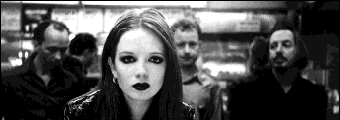
LA Times interview
Garbage picks up again with ‘Not Your Kind of People’
Last month, Garbage played its first concerts since October 2005, when the members of the influential alternative-rock group cut short a world tour and began what they referred to at the time as an indefinite hiatus.
Yet before a boisterous capacity crowd at L.A.’s El Rey Theater — where the band played a sold-out two-night stand following a last-minute warm-up gig at the Bootleg in Echo Park —Garbage sounded like it had never left, powering through its set with a muscular precision that belied the seven years it spent offstage.
“Really, you thought so?” asked the group’s singer, Shirley Manson, over tea the following morning at a Hollywood cafe. She was seated with guitarist-keyboardist Duke Erikson, who added with a laugh, “It’s funny how you can feel like a show is something of a disaster, but then the audience is into it.”
For the perfection-minded outfit responsible for such gloomy mid-’90s hits as “Stupid Girl” and “Only Happy When It Rains,” some attitudes evidently never change.
On May 15, Garbage — which also includes guitarist-keyboardist Steve Marker and drummer Butch Vig — is set to release a new studio album, “Not Your Kind of People,” its first since the pressures of promoting 2005’s “Bleed Like Me” led Manson to tell MTV, “I’m done, I’m burnt, I’m toast.”
But if songs like “Battle in Me” and “I Hate Love” demonstrate the persistence of the band’s pessimistic streak, they also reflect Garbage’s shifting role in the modern-rock marketplace — from trailblazers to standard-bearers.
Filled with fuzzy guitars and sleek electronic textures, Garbage’s self-titled 1995 debut offered a kind of techno-conscious counterweight to the prevailing post-grunge sound Vig helped engineer as the producer ofNirvana’s landmark “Nevermind.” And as frontwoman the Scottish-born Manson projected a dark glamour at odds with the regular-guy image ofPearl Jam’s Eddie Vedder.
“They were definitely ahead of the curve,” says KROQ-FM (106.7) music director Lisa Worden. On Saturday, Garbage plays the L.A. radio station’s annual Weenie Roast concert alongside Coldplay and Incubus at Verizon Wireless Amphitheater in Irvine. “And you can hear their effect in the way music has evolved, in bands like Foster the People and Gotye.”
Manson’s from-the-hip persona, too, has shaped the identities of a broad spectrum of younger artists, including Lana Del Rey and Pretty Reckless singer (and ex-“Gossip Girl”actress) Taylor Momsen, who calls Manson “the definition of cool.”
“She has just the right amount of tough and sexy,” adds Skylar Grey, a frequent collaborator of Eminem’s and Rihanna’s. “I always looked up to her as someone who had it all.”
Manson claims the pressure to continue innovating — to address the idea that rock has finally caught up with Garbage — didn’t weigh on the band as it recorded “Not Your Kind of People” inside the Atwater Village studio owned by the singer’s husband, Billy Bush. (Manson and Vig are both residents of L.A.; Marker lives in Colorado, and Erikson in Garbage’s original hometown of Madison, Wis.)
“We were like, ‘Let’s just do what we do,'” she recalls. “‘We don’t have to be sonic pioneers.’ And as a result it was actually a very enjoyable period.”
Garbage first reconvened over the phone two years ago to discuss the possibility of a one-off concert at the Hollywood Bowl with the Los Angeles Philharmonic.
“And the more we talked about doing this show, the more we said, ‘Wouldn’t it be fun to do some new songs?'” says Erikson. “Then we started talking about doing more shows around that one.” He laughs. “None of that happened. Instead we made an album.”
No one in the band had fond memories of Garbage’s major-label stint, which Vig remembered in an interview at the El Rey as a blur of morning-zoo radio appearances and “negative criticism” from hit-hungry executives. So it’s issuing “Not Your Kind of People” through its own label, StunVolume, an experience Marker says has so far proved “much more fun.”
“We control just about everything: what the art’s gonna look like, the T-shirt, whatever,” he says. “If something screws up, it’s our fault.”
That smaller infrastructure is matched by more modest expectations. Garbage’s manager, Paul Kremen, says the band’s “initial drive is to recapture the fan base” that drove “Garbage” and 1998’s “Version 2.0” to platinum sales. But carving out a space in the wider culture, as his clients did in their heyday, is trickier “when 60 hours of video are being uploaded to YouTube every minute. It’s hard to cut through that kind of cacophony.”
Especially, the band members acknowledge, with competing demands on their time, be they young children, Vig’s busy production career or the acting sideline Manson started up in 2008 with a role on Fox’s “Terminator: The Sarah Connor Chronicles.”
“We’re trying to be more measured about how carried away we get,” Erikson says. “I think we’ve learned how to be more focused when we’re in it and then how to leave it behind.”
Vig shares his band mate’s view but admits to cloudier thoughts in keeping with Garbage’s trouble-seeking songbook.
“It’s sort of daunting for me to look at the schedule for the rest of the year,” he says, referring to the summer tour that will keep Garbage on the road through the end of August. “I’m like, ‘What have we gotten ourselves into?'”